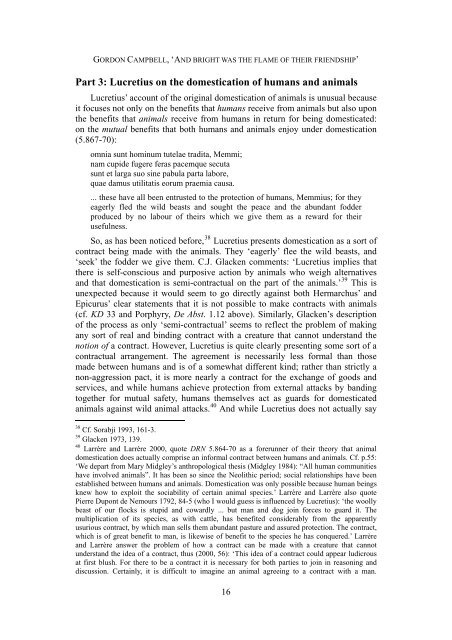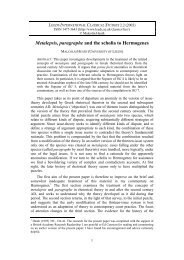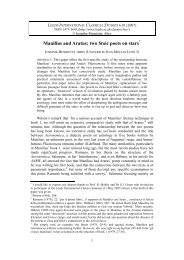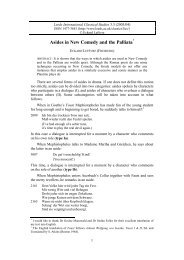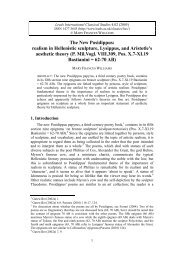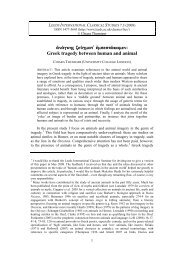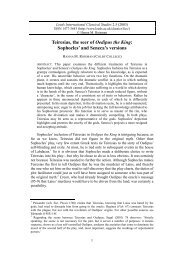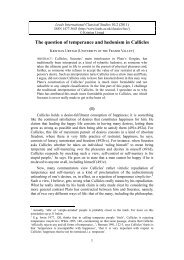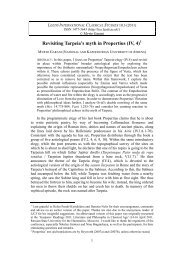'And bright was the flame of their friendship' - Leeds International ...
'And bright was the flame of their friendship' - Leeds International ...
'And bright was the flame of their friendship' - Leeds International ...
You also want an ePaper? Increase the reach of your titles
YUMPU automatically turns print PDFs into web optimized ePapers that Google loves.
GORDON CAMPBELL, ‘AND BRIGHT WAS THE FLAME OF THEIR FRIENDSHIP’<br />
Part 3: Lucretius on <strong>the</strong> domestication <strong>of</strong> humans and animals<br />
Lucretius’ account <strong>of</strong> <strong>the</strong> original domestication <strong>of</strong> animals is unusual because<br />
it focuses not only on <strong>the</strong> benefits that humans receive from animals but also upon<br />
<strong>the</strong> benefits that animals receive from humans in return for being domesticated:<br />
on <strong>the</strong> mutual benefits that both humans and animals enjoy under domestication<br />
(5.867-70):<br />
omnia sunt hominum tutelae tradita, Memmi;<br />
nam cupide fugere feras pacemque secuta<br />
sunt et larga suo sine pabula parta labore,<br />
quae damus utilitatis eorum praemia causa.<br />
... <strong>the</strong>se have all been entrusted to <strong>the</strong> protection <strong>of</strong> humans, Memmius; for <strong>the</strong>y<br />
eagerly fled <strong>the</strong> wild beasts and sought <strong>the</strong> peace and <strong>the</strong> abundant fodder<br />
produced by no labour <strong>of</strong> <strong>the</strong>irs which we give <strong>the</strong>m as a reward for <strong>the</strong>ir<br />
usefulness.<br />
So, as has been noticed before, 38 Lucretius presents domestication as a sort <strong>of</strong><br />
contract being made with <strong>the</strong> animals. They ‘eagerly’ flee <strong>the</strong> wild beasts, and<br />
‘seek’ <strong>the</strong> fodder we give <strong>the</strong>m. C.J. Glacken comments: ‘Lucretius implies that<br />
<strong>the</strong>re is self-conscious and purposive action by animals who weigh alternatives<br />
and that domestication is semi-contractual on <strong>the</strong> part <strong>of</strong> <strong>the</strong> animals.’ 39 This is<br />
unexpected because it would seem to go directly against both Hermarchus’ and<br />
Epicurus’ clear statements that it is not possible to make contracts with animals<br />
(cf. KD 33 and Porphyry, De Abst. 1.12 above). Similarly, Glacken’s description<br />
<strong>of</strong> <strong>the</strong> process as only ‘semi-contractual’ seems to reflect <strong>the</strong> problem <strong>of</strong> making<br />
any sort <strong>of</strong> real and binding contract with a creature that cannot understand <strong>the</strong><br />
notion <strong>of</strong> a contract. However, Lucretius is quite clearly presenting some sort <strong>of</strong> a<br />
contractual arrangement. The agreement is necessarily less formal than those<br />
made between humans and is <strong>of</strong> a somewhat different kind; ra<strong>the</strong>r than strictly a<br />
non-aggression pact, it is more nearly a contract for <strong>the</strong> exchange <strong>of</strong> goods and<br />
services, and while humans achieve protection from external attacks by banding<br />
toge<strong>the</strong>r for mutual safety, humans <strong>the</strong>mselves act as guards for domesticated<br />
animals against wild animal attacks. 40 And while Lucretius does not actually say<br />
38 Cf. Sorabji 1993, 161-3.<br />
39 Glacken 1973, 139.<br />
40 Larrère and Larrère 2000, quote DRN 5.864-70 as a forerunner <strong>of</strong> <strong>the</strong>ir <strong>the</strong>ory that animal<br />
domestication does actually comprise an informal contract between humans and animals. Cf. p.55:<br />
‘We depart from Mary Midgley’s anthropological <strong>the</strong>sis (Midgley 1984): “All human communities<br />
have involved animals”. It has been so since <strong>the</strong> Neolithic period; social relationships have been<br />
established between humans and animals. Domestication <strong>was</strong> only possible because human beings<br />
knew how to exploit <strong>the</strong> sociability <strong>of</strong> certain animal species.’ Larrère and Larrère also quote<br />
Pierre Dupont de Nemours 1792, 84-5 (who I would guess is influenced by Lucretius): ‘<strong>the</strong> woolly<br />
beast <strong>of</strong> our flocks is stupid and cowardly ... but man and dog join forces to guard it. The<br />
multiplication <strong>of</strong> its species, as with cattle, has benefited considerably from <strong>the</strong> apparently<br />
usurious contract, by which man sells <strong>the</strong>m abundant pasture and assured protection. The contract,<br />
which is <strong>of</strong> great benefit to man, is likewise <strong>of</strong> benefit to <strong>the</strong> species he has conquered.’ Larrère<br />
and Larrère answer <strong>the</strong> problem <strong>of</strong> how a contract can be made with a creature that cannot<br />
understand <strong>the</strong> idea <strong>of</strong> a contract, thus (2000, 56): ‘This idea <strong>of</strong> a contract could appear ludicrous<br />
at first blush. For <strong>the</strong>re to be a contract it is necessary for both parties to join in reasoning and<br />
discussion. Certainly, it is difficult to imagine an animal agreeing to a contract with a man.<br />
16


